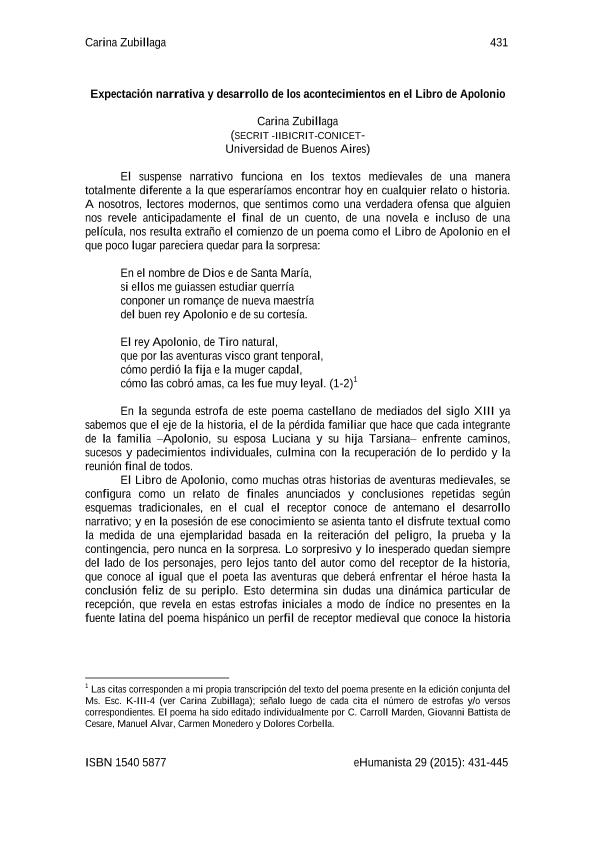Artículo
El suspense narrativo en las historias medievales, tan diferente de las formas y mecanismos actuales del relato, asume particularidades en las figuras del narrador, el receptor y los personajes de lo narrado. Particularmente en el "Libro de Apolonio", un poema castellano de mediados del siglo XIII, las adivinanzas y los sueños proféticos mantienen el suspenso y al mismo tiempo anticipan la anagnórisis, para así permitir que la acción narrativa avance. El reencuentro familiar se concreta, sin embargo, según otros procedimientos de recapitulación narrativa que se analizan en el presente trabajo. The narrative suspense in the medieval stories, so different from the forms and current mechanisms of the tale, assumes particularities in the figures of the narrator, the receiver and the characters of the narrated. Particularly in the Libro de Apolonio, a Castilian poem of middle of the 13th century, the riddles and the prophetic dream of the protagonist support the suspense and at the same time they anticipate the reunion to allow that the narrative action could advance despite its detention, te indirect movements and the implicits used. The familiar reunion takes place, nevertheless, according to other procedures of narrative recapitulation that are analyzed in the present work
Expectación narrativa y desarrollo de los acontecimientos en el "Libro de Apolonio"
Fecha de publicación:
03/2015
Editorial:
University of California. Department of Spanish and Portuguese
Revista:
eHumanista
ISSN:
1540-5877
Idioma:
Español
Tipo de recurso:
Artículo publicado
Clasificación temática:
Resumen
Palabras clave:
Narración
,
Acontecimiento
,
Aventura
,
Apolonio
Archivos asociados
Licencia
Identificadores
Colecciones
Articulos(OCA SAAVEDRA 15)
Articulos de OFICINA DE COORDINACION ADMINISTRATIVA SAAVEDRA 15
Articulos de OFICINA DE COORDINACION ADMINISTRATIVA SAAVEDRA 15
Citación
Zubillaga, Carina Alejandra; Expectación narrativa y desarrollo de los acontecimientos en el "Libro de Apolonio"; University of California. Department of Spanish and Portuguese; eHumanista; 29; 3-2015; 431-445
Compartir




